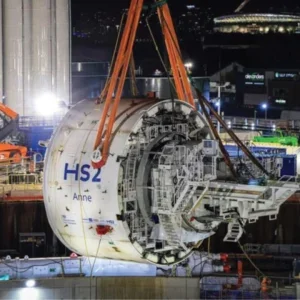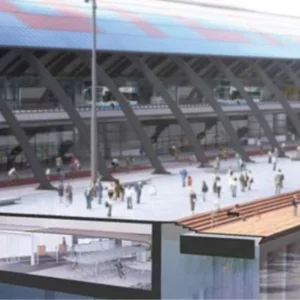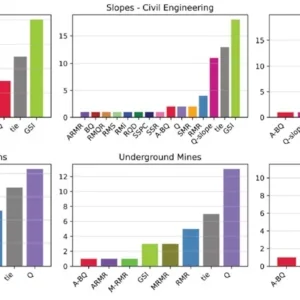We have a sizeable amount of tunnelling going on in the UK, including waste water project the Lee Tunnel and the power cable National Grid Tunnels coming on the back of completion at the Brighton sea outfall. The Crossrail tunnelling contracts are all placed and tunnelling began last month.
It can be argued the tunnelling boom has begun. But for it to continue a great deal of education is needed before there is an informed, honest and constructive dialogue between the industry and policy makers.
As tunnellers we are used to dealing with the challenges of the ground and, without chancing my arm or sounding smug, I might say that we have become better at this.
What we find difficult to deal with is the politics, bureaucracy, vested interests, local agendas and risk-averse bankers who will take enormous financial risks but run a mile from construction, let alone tunnelling risks.
These stakeholders influence the way that projects are developed, funds procured, even the way the works are specified and supervised.
Focus on quality
Although we have gone forward technically we do not seem to have learned all the lessons of Channel Tunnel Rail Link (CTRL), of the Heathrow collapse and of the teachings of Latham and Eagan’s ‘Constructing the team’.
We have not moved together, if anything we have moved apart. The team ethic is not very prevalent in some of the tunnelling projects despite the recognized benefits of collaborative working.
Some of our clients are beginning to understand this and are making determined efforts to realise the benefits by changing their ways. Others procure in a modern way but are using old-fashioned thinking and it is this that makes the difference. I was pleased to see chief construction advisor to the Government Paul Morrell’s comment that "clients knowing how to ask for what they need is the key to efficiency savings and consequent cost savings."
It will be interesting to see if that is picked up.
Over the last couple of years we have also had informed thinking from Infrastructure UK (IUK) and the National Audit Office. The first conclusion of the IUK report is that the UK contractors need a consistency of workload to invest in people, technology, skills and development.
UK contractors would not agree that we are there yet and we will not get there until we elevate quality (in its widest sense) to the principal selection criteria. If we concentrate on quality and performance in a collaborative manner, cost minimisation follows.
The problem is how to develop the mindset and environment in which a strategy of this nature can be realised.
Working together
Collaborative working is important because it can swing the emphasis onto to performance and capability and with a global tunnelling boom competing for UK resources we must maintain standards of education, training and best practice.
We need to have managers who understand tunnelling. We must not let corners be cut due to aggressive costing.
Quality in its widest sense must remain the maxim. Quality is of course one of the main contributions made by the BTS, along with education, information and identification of best practice.
We have moved forward in the BTS in the last two years, enhanced the BTS reputation, increased the membership, provided more services, become more inclusive and drawn more members into the activities of the society.
Establishing the sprayed concrete lining working group, improving the website, developing teachers’ packs, improving the courses in design and construction and health and safety, promoting debate, producing authoritative documents such as the ‘Monitoring Guide’, the BS 6164 update, the ‘Guide for Best Working Practice in High Pressure Compressed Air’, developing registration proposals for tunnellers, all help the profile of the BTS in the tunnelling world and make a contribution to the wider society.
The profile of the BTS in the corridors of power is another subject, but one under current debate. The role of a learned society is important in this respect but unclear.
This debate will develop because the government at last seems to have realized the benefits of investing in infrastructure, while the industry seems to lack a coherent voice.
Incoming Chair of the BTS Damian McGirr looks at the future challenges and opportunities for the UK tunnelling industry
In the UK we have a number of tunnelling projects either under construction or about to commence. These include Crossrail, Lee Tunnel, Preston Unsatisfactory Intermittent Discharge tunnels, London Underground station upgrades, National Grid and UK Power Network cable tunnels to name just a few. Over the past few years there have been a number of infrastructure projects under construction that incorporate a significant amount of tunnelling, however what has often been missing has been the planning and further investment in future projects to provide a continuity of workload.
Driving a change
Investment in infrastructure appears now to be high on the political agenda, and there are several major infrastructure projects being considered that will include tunnelling work. A careful structuring of these projects can create a steady workflow for the industry. Principal amongst these are:
• The recent announcement by the Government to proceed with the construction of High Speed Two from London to the West Midlands for delivery in 2026 with over 30km of tunnels;
• News from Scotland that Scottish and Southern Energy (SSE) is considering a new hydro scheme near Loch Ness;
• The plans for up to eight new nuclear power stations in the UK, which will include significant amount of tunneling and associated work;
• Further cable tunnels from both National Grid and UK Power Networks over the next 10 years;
• Proposals from Transport for London to further explore a potential crossing of the River Thames at Silvertown to supplement the existing Blackwall tunnel. Another road tunnel is one of the lead options under consideration;
• Upgrades on the London Underground network including Bank Station;
• The long-term management of Higher Activity Nuclear Waste;
• Not to mention the many other smaller but nonetheless vital tunnelling projects that are undertaken around the UK
But not all projects may come into fruition. There is a momentum building in support of the development of underground space; but there is still uncertainty in whether they will make it to construction and if they do, what the time frame might be.
Creating a continuity of workload will depend on two fundamentals: investment from both the Government and the private sector; and policy from central and devolved Governments to place the development of underground space firmly on the planning agenda as is now done in Hong Kong and Singapore.
Despite these difficult economic times financial investment has been forth coming as the Government has pledged funds, sometimes as part of economic stimulus packages. But more needs to be done by policy makers to ensure that at planning stage the viability of underground alternatives is considered.
The tunnelling industry also has to play its part. We as the UK tunnelling industry and through the BTS need to ensure that tunnelling has a continued and increasing role in the development of major projects through the promotion of tunnelling as safe, sustainable and cost effective.
The recent work by HM Treasury unit Infrastructure UK (IUK) into understanding the cost of infrastructure development in the UK was an important milestone in demonstrating that our industry can effectively deliver major projects.
Capitalising on this, an industry ‘pipeline’ has been developed to highlight future projects that will help remove some of the peaks and troughs in workload that have beset our industry.
The BTS is involved in supporting IUK in its work and has contributed by looking at the cost of tunnelling in the delivery of infrastructure projects. This support needs to continue, but we also need to increase our exposure to policy makers throughout the UK to ensure the development of underground space is firmly on the agenda when major infrastructure is being considered. The tunnelling industry has a role to play in demonstrating the business case for tunnelling as a viable element of major infrastructure projects. This can be done by ensuring that we can demonstrate an understanding of turn out costs and a sound approach to risk management in the same way as other sectors do.
We need to demonstrate value through the delivery of the current schemes being constructed in the UK. This will demonstrate that we have both the design and construction expertise within the UK to allow us to make the case for that tunnelling should be central to future infrastructure development and build upon on recent successes. As part of this we need to ensure that we demonstrate the high level of professionalism and competency that we undoubtedly have in the UK tunnelling industry.
Role of the BTS
The BTS will be looking at all of these issues in the coming months and years to ensure that we can have a greater exposure to decision and policymaking. It will spearhead the education of our workforce and ensure the UK keeps in line with global best practice. It will initiate a registration process for tunnellers.
As I write I am on my way to the University of Warwick to discuss further development of the MSc course in underground construction for the 2012/13 academic year and beyond to help ensure that we have the engineers that we will need for the future support and development of our industry.
More joined up thinking is required within our industry to realise that successfully delivering the current projects on time and within budget will prove to investors and decision makers that UK tunnelling is a sound investment. This confidence will secure future work in the many projects under discussion. Failure to secure a steady workload could lead to an exodus of tunnellers from the UK as the global tunnelling industry is in boom and demand is high for skilled miners.
The coming years will present new challenges for the industry and the BTS will take the lead in developing closer links with central and devolved governments to ensure a future for our industry.






